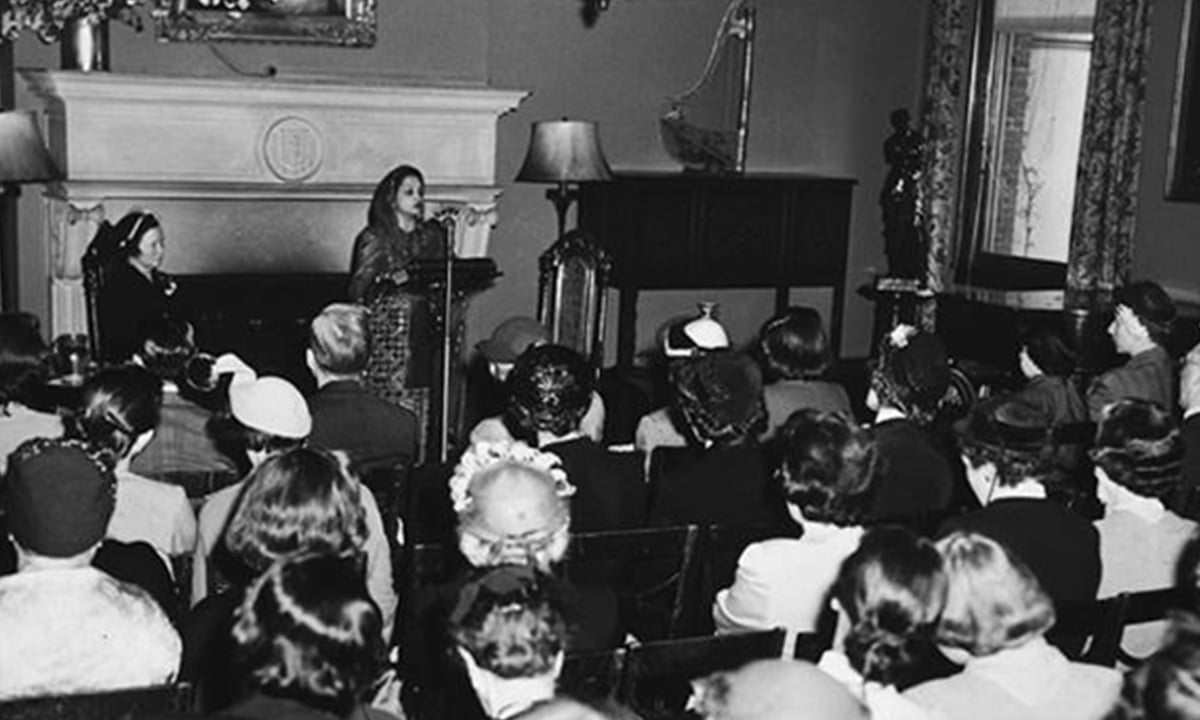Why my grandmother Ra’ana Liaquat Ali Khan’s 1964 speech is still relevant today
As I read through my grandmother Begum Ra’ana Liaquat Ali Khan’s speeches, beautifully put together by APWA in a book called Challenge and Change, I am continually amazed at their relevance for Pakistan today. The book, published in 1980, collates a selection of speeches from her public life as first lady, at the UN and nationally, between 1947 to 1979.
My grandmother, Begum Ra’ana Liaquat Ali Khan, faced the most formidable challenges throughout her lifetime, and her ability to create positive change out of these is awe-inspiring.
My grandmother never spoke about her past, and as a young child I never thought to ask. But I learned from people who knew her, or whose mothers had been with her in APWA, and what I read about her deepened my admiration. She became my mentor beyond the grave, and while I strive to achieve even a smidgeon of what she did, I fall far behind.

She was the only girl in her class at the University of Lucknow where she graduated with an MSc in Economics. She was a professor in economics when she met and married her husband, my grandfather, Liaquat Ali Khan. For him, she changed her religion, and her name. And became his equal partner in the independence movement.
The upheaval of Partition meant that she had to leave her roots behind, and look towards a future for herself and her family in a newly created Pakistan. Yet just four years later, she was faced with an appalling tragedy and a calamity for the nation — the murder of her husband, the first prime minister of Pakistan. She was only 46 years old with two young sons, less than Rs200 in the bank and no family in Pakistan.
Anyone else would have given up. She must have thought to do so too initially — how can one not when one’s world collapses? I can only be grateful today that she decided to strive on. That she believed and had the strength to continue to struggle for the values and aspirations that she lived by. The country may choose not to remember them, but this ingratitude is one of the many faults that have brought us to our current crossroads.
My grandmother was determined to address the challenges that faced Pakistan, and the title of my piece is actually in relation to a speech she made 60 years ago in 1964 titled “Pakistani women look to the future”. Upon reading this speech, I was astonished to find that policy issues that are currently trending today had been highlighted by her at the time. She discussed five priority policy areas which I lay out here, to give readers opportunity to reflect for how long we have been duped and deceived by our supposed leaders.

First, she speaks to the fact that the top priority for government needed to be a focus on children and youth, and therefore education. She reflected that education had been consistently “ignored, bungled…and relegated to the bottom”. I observe our education system today and cannot find a truer analysis of the situation. Between the 26 million out-of-school children and a majority of those in school unable to read or write at the level of their grade, the situation is truly abysmal. She warned that this hypocrisy towards education would create dangerous outcomes unless addressed, that without creating a nation of people with a fundamental sense of values who could think for themselves, prosperity would not be achieved.
We are facing those outcomes now.
Second, she discusses the development and status of women, so that they may contribute equally in the home, community and towards national development. Her aspiration was to see that every girl was able to earn a dignified livelihood without discrimination. To this end she urged for expanding training, retraining, scholarship and employment facilities that would catch up to the market demand for teachers, nurses, doctors, lawyers, and a host of other professions. Today, the rhetoric of women’s empowerment plays out across boardrooms and conference halls, but in reality, we remain far behind.
Toxic masculinity is rampant and serious intent is lacking. That we had a woman prime minister and currently have a woman chief minister does not make up for what the other 112 million women in Pakistan face daily. I saw that the new Awaam Pakistan Party launched its women development approach paper as a key priority issue. In it, it addresses economic uplift, health and education, political participation and violence against women and behoves other parties to follow suit and re-prioritise the economic, social and political equality of women in their manifestos.

My grandmother’s next two priority areas were population control, and agriculture and nutrition. Family planning should have been a key government policy at the time — so why was it not? I realise that like today, the focus then was also on gaining and keeping power. But what really struck me was her focus on the nexus between agriculture and nutrition. She discussed the need for food security, and agri-research, processing and value-chain development to ensure cheaper, nutritious and more readily available food. Had importance been given to her priorities, it is possible that today Pakistan would not be losing 35 to 40 per cent of its perishable produce because of the lack of processing and preservation.
My grandmother’s final priority area was what she termed ‘Clashing Cultures’. I believe here she meant the transition that was occurring then between traditional and modern. Her advice was to adapt intelligently to the new with a strong core of personal and social values which were inclusive rather than divisive, and which could be a source of inspiration and satisfaction. Unfortunately, the cultural transition that followed and was fuelled in the 70s and 80s by a thirst for power embedded within itself the core value of exclusion.
Within government, religion, society and polity, those in power sought to exclude and divide, and they did so with such success that today we as a nation have very little unity, fading faith, and no discipline.
Cover photo provided by the author












Comments